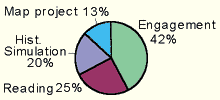HSci 1814 || Intro to History of Science: Ancient Science to the Scientific Revolution (Spring 2005, Instructor: Douglas Allchin)
Course Information:
Books •
Evaluation •
Academic Integrity •
Contact
Evaluation Form •
HSci 3814 ||
Print syllabus.
Books -- available at Coffman
Turnbull, Maps are Territories
Galileo, Dialog Concerning the Two Chief World Systems (Stillman Drake trans.)
Course packet — see reading list. Print your own cover in color?
Recommended reference: Stephen Mason, A History of the Sciences (1962). -- This book can serve as an excellent general text for reference. While now out-of-print, it is available through several used bookstores online [or here].
- EVALUATION
- The most important element for your learning at the collegiate level is to become engaged with the material and to develop your thinking skills (in this class, interpreting texts and events in historical context, and articulating the nature of science through case examples). The course is structured on the principle that you take responsibility for your own learning. There is no single list of facts to memorize and repeat on an exam, as dictated by an instructor. You choose to some degree what you will learn and, likewise, how to demonstrate what you have learned (guidelines below). Each student completes a form outlining how they elect to be evaluated. Each student also submits a self-evaluation (with a letter grade) at the end of the course.

Required (58%):
Attendance and participation in class discussion — expected. Your final mark may be raised (or lowered) 1/3 grade (ex: B => B+) for notably strong (or weak) contributions. For each class missed, the final grade is lowered 1/15 of semester's work, or 1/3 letter grade.
Evidence of reading and engaging original texts (25%)
 Each class involves discussion of reading, typically an original historical source. It is important to complete the reading and to have thought about it before class. The standard format for documenting your preparation for class is to post your comments on the class bulletin board by the Monday before Wednesday class. A Reading Guide is available each week to help orient you. Your comments should be brief, but include at least one quote or specific reference (each with page #).
Map project. (13%)
Historical Simulation [Galileo Retrial, Boyle Debate, or Newton Debate]. (20%)
Each class involves discussion of reading, typically an original historical source. It is important to complete the reading and to have thought about it before class. The standard format for documenting your preparation for class is to post your comments on the class bulletin board by the Monday before Wednesday class. A Reading Guide is available each week to help orient you. Your comments should be brief, but include at least one quote or specific reference (each with page #).
Map project. (13%)
Historical Simulation [Galileo Retrial, Boyle Debate, or Newton Debate]. (20%)
Elective Forms of Evaluation (42%)
A central aim of class is for you to engage the material intellectually and to think about the texts that you read and the topics we discuss in class. You may do this in many ways: in two essays, through a journal/think-notebook (3rd-4th-yrs), in an essay final exam, or a combination of these.
- Extension Essays. (21% each) Topics will be offered periodically. Each essay is due the following week. These will parallel themes addressed in the final exam, but be completed on your own schedule and according your interests. They should be short (~3-4 pp. = ~750-1000 wds). They may be informal in tone, but should communicate clearly and reflect thoughtful consideration of the issue(s). The advantage of the essays is that when they are done, this part of your grade is done.
- Journal. (up to 42%). Upperclassmen may prefer to keep a think-notebook, or journal, to explore readings and issues raised in class. This is not merely a diary for expressing feelings or personal reactions. Rather, it is for probing topics, alternative solutions and implications, perhaps adding personal examples. It should always amplify or extend the reading and go deeper than class discussion. I will preview each journal once during mid-term.
- Final Exam. (up to 42%). This is elective. The exam will be 2 essays (choice of 5, 21% each), in which you will be expected to integrate general themes and specific examples from across individual class sessions.
- Special projects (up to 42%) — for example:
- redoing a historical experiment, or reconstructing and using a historical instrument or technology
- researching an episode from the history of the topic you study for your major
- [for teachers] a science curriculum case study or project focusing on "history and nature of science"
- extension work on the Map Project or your Historical Simulation.
All projects here must be preapproved.
The S/N threshold is C (2.0).
Be sure to complete your form.
Academic Integrity
Discussion and collaboration are encouraged. However, all submitted work must be yours exclusively. It should reflect your own learning (for example, do not write while another class member is present). Acknowledge all sources and cooperation. Unsure what to cite?: see helpful guidelines. For principles and policies at this university, consult: www.osai.umn.edu/gopher.html. For rules of conduct, see: www.sja.umn.edu/conduct.html. Electronic technologies may be used to enforce this policy.
HSci 1814 Hub || Aims • Schedule • HSci 3814 • Contact Information || Announcements
|
